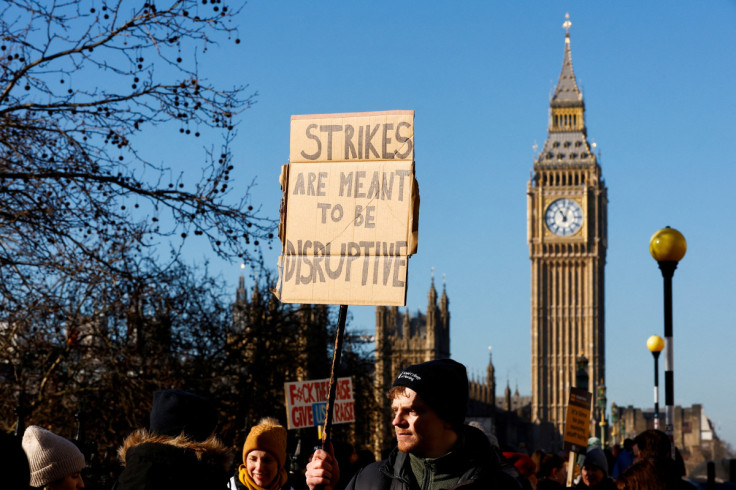UK Government implements pay increases for public sector workers amid strikes
UK government offers pay raises to public sector workers amidst strikes. Junior doctors walk off the job for five days. Concerns were raised about NHS costs and patient care.

In an effort to address the ongoing strikes triggered by a cost-of-living crisis, the United Kingdom government has offered pay raises to millions of public sector workers.
Treasury Chief Secretary John Glen announced on Thursday that the government has accepted recommendations for pay increases, ensuring at least a six per cent raise for doctors and teachers.
While the pay raises fall below the current 8.7 per cent inflation rate, they are aimed at bridging the gap caused by the significant industrial unrest across Britain due to falling real wages. Under the new measures, junior doctors will receive a six per cent pay uplift and a lump-sum payment of £1,250 ($1,633.25), while teachers will see a 6.5 per cent increase. Pay raises of seven per cent for police and five per cent for armed forces personnel were also announced.
Glen clarified that the pay increases would not require new borrowing or additional spending. The funding for teachers' pay rises will come from a reallocation of the existing education department budget.
The announcement comes amidst a five-day strike by junior doctors in England that began today and will continue until 07:00 BST on Tuesday, July 18. Numerous planned appointments will be postponed, and senior doctors will step in to provide emergency care before going on strike themselves next week on Thursday and Friday. However, individuals can still contact emergency services at 999 for life-threatening emergencies.
NHS health chiefs have expressed frustration with the continuous strikes, highlighting the significant financial impact and estimating that the current junior doctors' walkout will cost the NHS well over £100 million. Health bosses emphasise the challenges hospitals face in finding staff to cover shifts, resulting in the cancellation of tens of thousands of appointments and surgeries daily.
According to the British Medical Association (BMA), pay for doctors has decreased by more than a quarter since 2008 when inflation is taken into account. The BMA stated that striking was the only option as the government's five per cent pay offer falls far short of the 35 per cent demanded. The government argues that such a figure is unreasonable and warns that the strikes risk patient safety and will lead to further postponement of treatments.
The warnings from health leaders align with a survey conducted by NHS Providers, which represents trusts, revealing that one-third of hospital chiefs lack confidence in meeting Prime Minister Rishi Sunak's promises to reduce NHS waiting lists. Hospital chiefs are concerned about cancelling leave during the ongoing crisis to avoid staff burnout. They also expressed difficulty finding staff to cover junior doctors' shifts, as many feel there is no end in sight and are prioritising their own well-being.
The report by NHS Providers further indicates a lack of confidence in meeting targets, including eliminating the number of patients waiting more than a year for care by March 2025 and having 75 per cent of patients urgently referred for suspected cancer diagnosed or ruled out within 28 days. The survey also reveals doubts about meeting targets for 76 per cent of patients to be seen within four hours in A&E.
Sir Julian Hartley, Chief Executive of NHS Providers, expressed concern over the impact of strike action on productivity, cost, patient wait times, staff morale, and the mounting expenses associated with strikes. The costs of strikes have been estimated to be around £10 million for the April strikes alone.
One NHS chief said: "So it's costing us close to a million pounds each time there's a three-day strike. So add that up, across, each time we have a strike across the country, there's an awful lot of money being lost to this process."
They added: "I don't think you can underestimate the tensions, and the potential with this good division that this creates, between obviously leaders, and staff, but also among staff themselves."
Another said: "It's cost us circa a million for each [strike], and actually, that was each three-day strike. So you could do the math on five days ... I'm really worried about the kind of long-term damage it does to relationships within the NHS ... I'm fed up of industrial action."
While Health and Social Care Secretary Steve Barclay finds it disappointing that the British Medical Association is proceeding with further strike action, he acknowledges that the five-day walkout by junior doctors will have a significant impact on thousands of patients, jeopardising patient safety and impeding efforts to reduce NHS waiting lists.
The ongoing strikes and the government's response underscore the challenges faced by the UK healthcare system as it grapples with addressing pay disparities, managing patient care, and maintaining the morale of healthcare professionals.
© Copyright IBTimes 2025. All rights reserved.






















